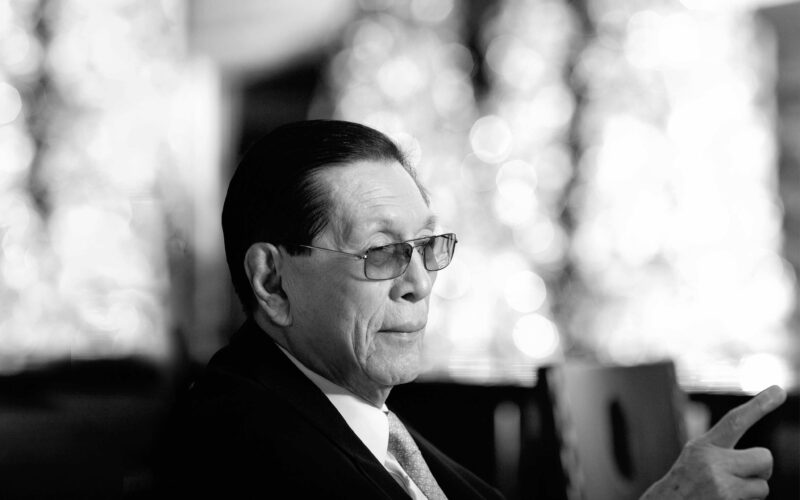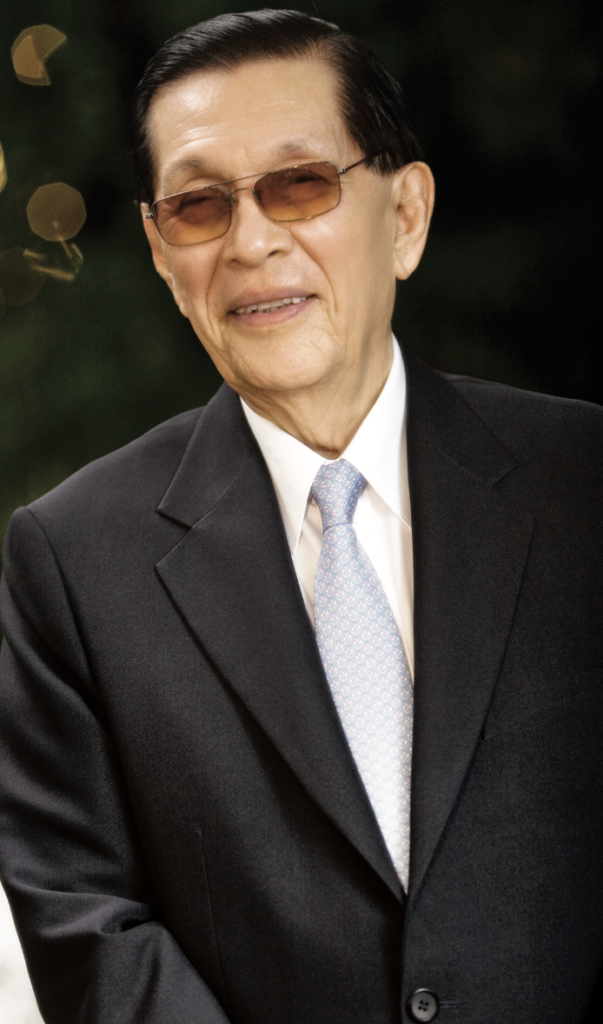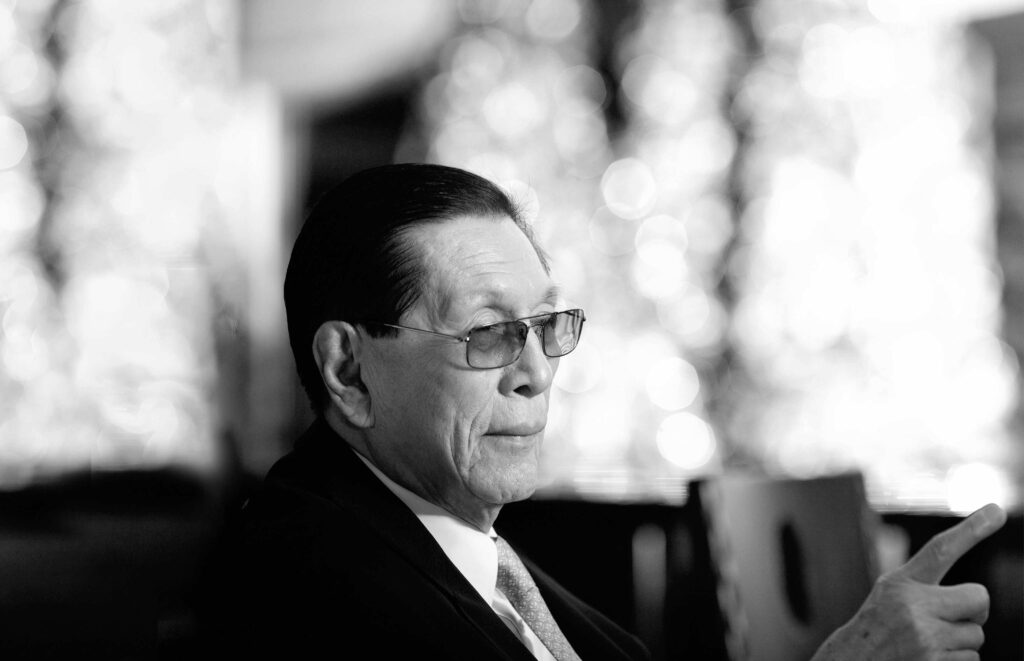Former Senate President Juan Ponce Enrile turns 100 today. On Feb. 14, 1924, Juanito was born in Gonzaga, Cagayan to a fisherman’s daughter named Petra Furagganan. His father, who he did not see as a kid, was Alfonso Ponce Enrile, a young, powerful politico. But being born out of wedlock and teased a bastardo was the least of young Juanito’s concerns.
In this piece by KAP AGUILA MACEDA for PeopleAsia’s December 2010 issue, the magazine’s “Lifetime Achievement” awardee showed why the immortal JPE is also a “lion among lambs.”
Senate President Juan Ponce Enrile is a lion among lambs. At 86, he is still on top of his game. His wits are razor-sharp, he recites poetry from memory, and foregoes canned answers for eyebrow-raising, opinionated ones.
Any compelling movie worth its salt features a convincing protagonist whose life is invariably, inevitably fraught with danger and seemingly insurmountable obstacles. His ability to rise above these challenges defines his greatness. The more hopeless the situation he extricates himself from, the larger his legend becomes; the bigger hero he is. As the flick ends, the credits scroll up, and the audience is suffused with awe and, more importantly, hope.
And when Juan Ponce Enrile regales you with the tale of his life, you realize this movie is all about him. Enrile’s resume is long as it is impressive; he has nothing left to prove. Businessman, legislator, government official, lawyer, Manong Johnny: Each of these hats is sewn together with a common thread that, I submit, defines him: a survivor.
Johnny Ponce Enrile almost drowned in a river as a kid. He could have died from dysentery, but he recovered – unlike a sibling who succumbed to it. He could have been knifed to death by his schoolmates. He could have been shot or decapitated by the Japanese. He could have been killed by soldiers loyal to President Marcos.
Once upon a time
On Feb. 14, 1924, Juanito was born in Gonzaga, Cagayan to a fisherman’s daughter named Petra Furagganan. His father, who he did not see as a kid, was Alfonso Ponce Enrile, a young, powerful politico. But being born out of wedlock and teased a bastardo was the least of young Juanito’s concerns.
Left with his mother, the Senator admits it was a “tough life.” He shares: “Our house was a one-room affair. My mother, stepfather, half sisters and half brothers were all sleeping on the floor. Our house was on stilts, and it had a silong.”
Enrile continues: “During the cold monsoon season, we would dig a hole underneath the house, put firewood, and make a fire underneath. We could buy farmland and hire labor for a fee to plant and harvest rice but basically our occupation was fishing. I was quite adept at fishing in the river and open sea.”
As he speaks, seated in his favorite chair at the Enrile abode in Dasmariñas Village, Makati, his daughter Katrina (second to son Juan Jr.) observes from nearby – riveted to the tales she perhaps has heard countless times. The admiration and love she has for him are unmistakable, as she later also dotes on him for his exclusive pictorial for People Asia on this balmy early evening.
Johnny shares that he had quite a number of half-siblings by his father – 17 of them, in fact. He says with a smile that his father was quite the ladies’ man, and asks an aide to fetch a framed black-and- white photo of his dad – a good-looking fellow, indeed.
As for Enrile’s mother, she had seven children – yet Johnny is the only fruit of the fateful, albeit fleeting, union of his parents.
“My mother did not want to tell me about my father, probably because she was embarrassed about my birth. But I told her, ‘Why are my classmates calling me bastardo?’ Finally, she told me, ‘Your father is a lawyer. He’s in Manila.’ She gave me the only photograph she had of my father. It was not really a photograph; it was one of those things that a candidate distributes to voters during the campaign,” Enrile recounts. “Still, you can imagine how big our family was.”
Sen. Juan Ponce Enrile has a Master of Laws (with specialized training in international tax) from Harvard Law School in Boston. He is a Scholarship Award recipient from the same institution. Prior to that, he finished Law at the University of the Philippines-Diliman – cum laude and the salutatorian of his batch. He passed the Bar in 1953, placing11th, garnering a 91.72 rating and a perfect score in Commercial Law.
One could thus be pardoned for being incredulous when the Senator says that there was no school in their barrio when he was a young boy. “Schools were in towns. The barrios were never provided with schools, and all the young kids who wanted to study or who were of age, based on the educational system under the Americans, had to be transported by boat (to the towns).”
One day, his grandfather from Botolan, Zambales took Johnny and accompanied him by boat. “We left our place at daybreak, arrived at the mouth of another river at about noon, and we walked for another two hours to get to the center of the town where I was deposited to a teacher-cousin of my mother. I was to be their houseboy. In exchange, I could go to school,” he narrates. “To go to school, I had to walk a good half day through rocky roads, hills and mountain terrains, and a long stretch of coastline.”
Johnny and his classmates walked barefoot. “Nobody used shoes in those days to go to school. There was no transportation, except for your legs. If you were lucky you could ride a carabao or a horse,” Enrile continues.
A break came by the end of fourth grade, when a certain Mayor Suzario Peralta saw the potential in Johnny and sponsored him from grades five to seven. “When I finished grade seven, I was already 16 years old,” Enrile says with a smile.
Peralta then helped him get a scholarship in a private school in Aparri called Cagayan Valley Institute. In his second year at high school, just as Johnny was settling into a routine, fate stepped in to thwart him anew. This time, it almost cost Enrile his life.
One morning, clad in a white shirt and white pants as was the custom in that era, Johnny was on his way to class on the second floor of the school’s wooden building when, “Four guys stepped out behind me with knives unsheathed. They started stabbing and hacking me,” he recounts. “I have scars all over my body to prove it. My hands were cut because I was parrying the knives. I had to jump over the window from the second floor.”
Who were these rogues and what was the motive of the attack? “These were children of the members of the (school’s) Board of Trustees,” Enrile reveals. “I knew them. They suspected that I was courting a pretty girl who was seated beside me and who belonged to a middle-class family. But the truth of the matter is that I could not be interested with anybody at that time.”
The young girl, Enrile still insists, merely asked him to tutor her in Math.
Bloodied and bruised
Bloodied and bruised, Johnny managed to flee to the municipal building, a good 150 meters from the school, where he received treatment from Dr. Alfredo Gorospe. “He dressed up my wounds, cleaned, and sutured them – without anesthesia,” he says. Johnny Ponce Enrile later filed cases against his attackers, but the municipal judge dismissed the case reportedly because, “these guys were well- connected and they got all the good lawyers in town.”
The worst part was to come. “The school expelled me, instead of punishing these guys. They claimed that I was the one who provoked them even if I was unarmed,” he reveals. The whole school, Enrile insists, saw the fracas, but as things happened he ended up going home.
“I felt a terrible letdown and injustice. It was an oppressive event. I made a vow on that day that, if ever I’d be given a chance in life, I’d want to be a lawyer. All my life from then on, I have been fighting for justice. I hate people who oppress other people. Even now, I fight for people who are being oppressed. When I became Secretary of National Defense, I never allowed any torture. The moment I knew of soldiers torturing people, I kicked them out. You can check the records,” he declares.
“That’s what I have been doing in all these years in building all these businesses – to give a chance to people – impoverished people like me before. That’s why I agreed to clean up the Customs bureau and the insurance commission, to declare Martial Law in order to put order in this country, why I gambled my life in EDSA in order to restore freedom and hope again in this country when I saw that what I participated in, which was Martial Law, turned sour.”
After his wounds healed, Johnny applied as a laborer – earning 75 centavos a day for backbreaking work on a road construction project. There he worked from August to exactly November 1941, after which he walked all the way to Gonzaga (about 40 kilometers, Enrile recalls) then to Aparri and back. Enrile remembers vividly that the day he arrived at Gonzaga was the day the Japanese Imperial Army landed there – Dec. 10, 1941.
Johnny Ponce Enrile fought for his country by joining the guerillas and their dangerous sorties. He narrates: “I was captured and imprisoned from Oct. 10, 1944 to Jan. 8, 1945 in the town of Loalo.”
Enrile could have again perished the day he escaped, for that was the day the Americans launched an air raid against the Japanese.
Johnny quickly rejoined the guerillas until the war ended. “Around July, I was working at a quartermaster depot of the Americans in the same school that expelled me and then my father sent for me. He got the help of a Gen. Courtney Whitney who was the judge advocate general of Gen. Douglas MacArthur to locate me because he learned that I was alive.”
That was the first time Johnny met his father. “I was escorted into a room and here was a man in khaki shirt and khaki pants with white, grayish hair. He stood up, came forward and embraced me and he said, ‘I’m sorry, my son, that I abandoned you.’ I did not say much. After that I felt awkward that I was being embraced by this man who finally said: ‘I’ll take you home.’”
Anything goes
“Ask me anything,” he says – daring me with a good-natured grin.
“Sa totoo lang (In truth), people did not know the reason why EDSA transpired,” he begins. “I was targeted to be assassinated and I knew that the country was going to be placed in a military junta because it turned out that Marcos was sick. When I learned of this, we started the RAM (Reform the Armed Forces Movement). We wanted him to step down. But maybe it was fate. Marcos announced a snap election between him and Cory. This changed the direction of the RAM because should Marcos lose, there would be no reason for our cause. If he won fairly, then there was no need for us to go against the will of the people. We never in our planning thought of using people to be with us, we planned the operation as a purely military operation. We had 10,000 people in our organization, I was the commander-in-chief of that organization.”
Enrile didn’t factor in People Power; he was quite ready to die for his cause. “Even now as a Senate President, when I take a position, I gamble my future. I don’t hesitate. I never rush anything. I have to study it, plan it, and when I am satisfied that I have an even chance to survive, then I take it,” he maintains.
So, what ails the Philippines, the perennial lady-in-waiting?
He declares: “You must start with the leadership. The leadership must be committed to do exactly what it says. Don’t talk about corruption if you are corrupt. At least that’s one thing I like about Noynoy Aquino. He does not talk about agrarian reform because he cannot do agrarian reform because his family owns a hacienda, and he is honest. He is willing to face the reality of the given, that is the way it should be.”
“The government is weak in relation to the elite in this country. They can destroy you. They are in control of the media. Why are businessmen in radio, television, newspapers, publishing? Why? They want to protect themselves, so they manipulate it.”
Behind his colored glasses, Enrile’s eyes still have the gleam of a man who loves life. Despite all that he has made happen for himself, he believes he is but an instrument of a Higher Being.
“We are his pawns, for whatever reasons he has. We think we control our lives – maybe we have some degree of control – but in the end, He is the one that decides how long or short you live, how you will fare in this world, what you will be. That’s it. You cannot tell,” he says.







